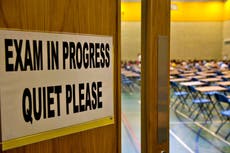Students receive A-level results as ministers in England aim to restore pre-pandemic grades
This cohort could face greater disappointment as their inflated GCSE results could leave them with higher expectations, sector leaders say

School leavers across the country are waking up to their A-level results in a year when ministers in England are aiming to restore pre-pandemic grades.
Hundreds of thousands of students in England, Wales and Northern Ireland are receiving grades to help them progress on to university, work or training – with the proportion of top A-level results expected to fall on last year.
Last year, more than a third (36.4 per cent) of UK A-level entries were awarded A or A* grades, compared to 44.8 per cent in 2021 and 38.5 per cent in 2020.
Students could face more competition for university places this year due to a growth in 18-year-olds in the population and international demand, it has been suggested.
In England, exams regulator Ofqual has said this year’s A-level results will be lower than last year – but they are expected to be similar to those in 2019.
In 2019 – the last summer before the pandemic – around one in four (25.4 per cent) UK A-level entries were awarded A or A* grades.
But in Wales and Northern Ireland, exam regulators have said they do not expect to return to pre-pandemic grading standards until 2024.
The cohort of students who are receiving their A-level results did not sit GCSE exams and were awarded teacher-assessed grades amid the pandemic.
Leaders in the education sector have warned that this cohort could face greater disappointment on A-level results day as they may have higher expectations after receiving record-high GCSE results in 2021.
Geoff Barton, general secretary of the Association of School and College Leaders (ASCL), told the PA news agency: “Their aspirations will have been raised because of the results they got at GCSE.
It’s a bit of a mess and the best advice is for people to act swiftly
“And yet what they’re going to see [on Thursday] in most cases is that however their sister or brother did last year getting a string of top grades that is less likely to happen this year.”
Mr Barton added that he has heard anecdotal evidence that some teachers have predicted grades for students “more akin” to during the pandemic years despite the return to pre-Covid grading standards in England this year.
“Whereas we will always see some disappointment on results day, that disappointment might be intensified if those young people feel that actually, the kind of grades they were getting through the year and on their Ucas reference from the school reflected something higher than in reality they could be getting [on Thursday],” he said.
Schools Minister Nick Gibb has said exam results in England need to return to pre-pandemic levels to ensure A-levels carry “weight and credibility” with employers and universities.
But he said “additional protection” is in place this year where grade boundaries will be altered if senior examiners find national evidence of a drop in standards compared with 2019.
I’m incredibly proud of all students receiving their results today
It comes after Covid-19 led to an increase in top A-level and GCSE grades in 2020 and 2021, with results based on teacher assessments instead of exams.
Nick Hillman, director of the Higher Education Policy Institute (Hepi), told PA: “For me, the biggest concerns are likely to be around people who get less good results than they expected and who may then miss their firm offer and possibly also their insurance offer.
“Remember, this is the cohort that got stellar GCSE grades so more than usual will be disappointed by their deflated A-level results and they will then find there’s less choice than in recent years in clearing.”
He added: “Even if they do find a place they’re happy with, they may then struggle to find decent accommodation, which is in short supply in many cities. It’s a bit of a mess and the best advice is for people to act swiftly.”
As of Wednesday morning, the day before A-level results day, a PA sample of 130 of the UK’s largest higher education providers showed there were 22,521 courses with vacancies for undergraduate students living in England on the Ucas clearing website.
A similar analysis last year carried out the day before A-level results day, showed there were 22,685 courses with vacancies on the clearing site – which is slightly more than the number available this year.
Clearing is available to students who do not meet the conditions of their offer on A-level results day, as well as those who did not receive any offers.
Students who have changed their minds about what or where they wish to study, and also those who have applied outside the normal application window, can also use the process.
Last week, Ucas chief executive Clare Marchant urged students to be “quick off the mark” on A-level results day as said she believed a lot of the highly selective courses would go quickly in clearing.
Students in England have faced some level of disruption to their schooling due to Covid-19, as well as a series of teacher strikes since February this year.
Carl Cullinane, director of research and policy at the Sutton Trust social mobility charity, warned that the return to pre-pandemic grading for this year’s A-levels “doesn’t bode well for disadvantaged students.”
He told PA: “Disadvantaged young people were impacted most by school closures and have faced further disruption through the cost-of-living crisis.
“With an approach to grading this year which doesn’t take account of these experiences, less well-off young people are facing a cliff edge.
“Universities should consider the disruption different young people have faced when confirming places on the back of A-level results.”
T-level results will also be received by thousands of students in England on Thursday, and youngsters across the country will be awarded their level 3 vocational and technical qualification (VTQ) exam results.
Education Secretary Gillian Keegan said: “I’m incredibly proud of all students receiving their results today. For many, this will have been the first set of formal exams they have ever taken, having faced unprecedented circumstances in the years building up to this summer.
“I know young people will have risen to the challenge, and thousands will get the results they need to take hold of their future, whether at university, through an apprenticeship or in the world of work.
“There are more options than ever before and a huge amount of support available, whether pupils get the results they wanted or not.
“Congratulations to each and every young person taking their next step and thank you to the teachers who helped them get there.”
In Scotland, the Scottish Qualifications Authority (SQA) has taken a sensitive approach to grading and modified course assessments this year.
Figures released by the SQA last week showed the pass rate for exams in Scotland is down from last year, but it remains above 2019 levels.



Bookmark popover
Removed from bookmarks